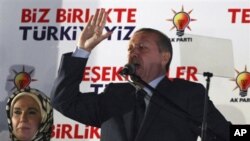Turkey's ruling Justice and Development Party has been re-elected for an unprecedented third time in a general election. The party increased its votes, securing around 50 percent of the ballots cast. But Prime Minister Recep Tayyip Erdogan fell well short of his goal of a two-thirds parliamentary majority, needed to rewrite the constitution.
Supporters of the ruling AK party celebrated their unprecedented victory. Despite the caustic mood of the election, voters seem relaxed and focused on the future a day after Sunday's poll.
"Tayyip Erdogan coming back to power is very good for Turkey. Now we need to get rid of our military constitution and replace it with a democratic one," said one voter.
However, another woman voted for the main opposition party.
"I am a little disappointed, but if the prime minister does not behave like a king we will be ok," she said.
We speak to VOA's Baris Ornarli about the Turkey election results:
Despite the magnitude of Mr. Erdogan's victory with 50 percent of the vote, he fell far short of his target of a two-thirds majority needed to pass constitutional change, a key priority for his administration.
"The message of the electorate was crystal clear to me; Mr Erdogan does continue to rule. But [he] does consult with the opposition in the parliament to solve the burning issues, i.e. the constitution and the conflict,"said Political scientist Cengiz AktarAktar.
With 325 seats in parliament, Mr. Erdogan is five short of being able to submit constitutional reform to a referendum. That means he needs support from at least another party within the parliament to achieve his goal. In his victory speech to his supporters, the prime minister dropped his traditional polarizing rhetoric and reached out for consensus.
"We will be seeking consensus with the main opposition, the opposition, parties outside of parliament, the media, NGOs, with academics, with anyone who has something to say, " he said.
There is a basis for consensus. Both the main opposition, the People's Republican Party, or CHP, and the country's pro-Kurdish Peace and Democracy party support replacing the 1982 constitution written by the country's military rulers. But differences remain over what that change should be.
Political scientist Aktar warns that the prime minister made similar promises of consensus to introduce constitutional reform following his last election victory.
"He is doing it for the second time," he said. "Actually his so-called balcony speech in 2007 was even more liberal than this one. But nothing came out of it. The initiative is fully and 100 percent in his hands."
The failure to introduce constitutional reform was blamed on the confrontational relationship between the prime minister and the then-leader of the main opposition People's Republican Party.
But Sinan Ulgen of the Turkish research firm Edam says this time, if Mr. Erdogan is ready to work on consensus building he may find a more willing partner.
"Here the difference is we have a new CHP," said Ulgen. "The new leader has adopted a much more liberal approach and therefore going forward, the AKP may find a much constructive counterpart in the Turkish parliament in order to enact the needed constitutional amendments. The uncertainty relates to the Kurdish faction which relates to the BDP, because they are really second winners of the elections."
The pro-Kurdish BDP increased its representation from 20 to 36 seats mainly at the expense of the AKP. That victory is expected to result in them putting more pressure on the prime minister to do more to meet their demands to help end the ongoing conflict between the Turkish state and the Kurdish rebel group the PKK.
Bridging those differences, both personal and political, between the two parties will be a key test for the prime minister.




